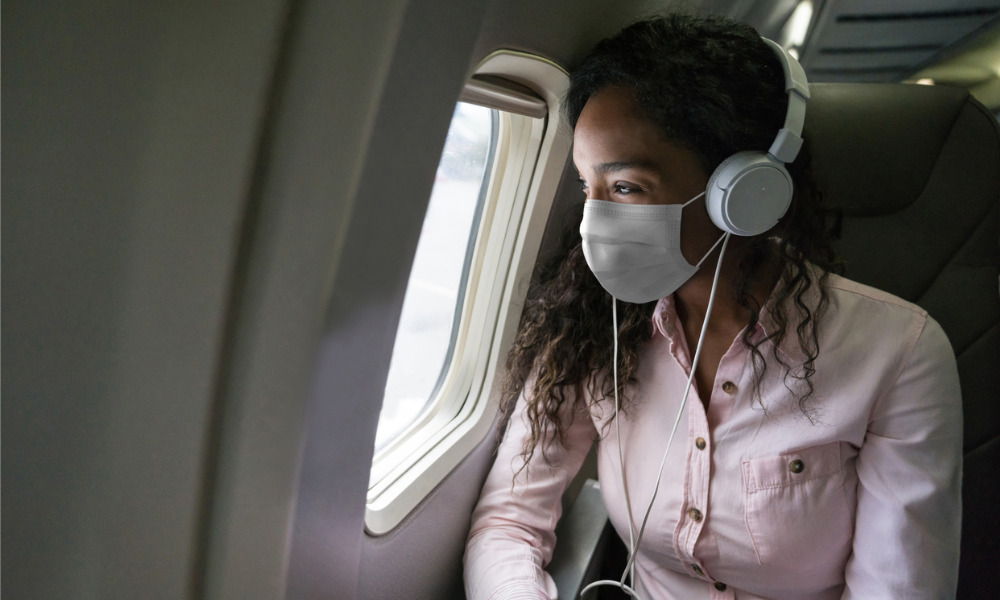Can trips be prohibited? Should workers be disciplined?

The news has been filled lately with coverage of various Canadian politicians and health-care workers being lambasted for travelling outside of the country as leaders admonish the rest of us to stay home. So, how should employers respond to workers who may be considering taking a vacation to a sunny destination?
Canadian HR Reporter asked Brittany Taylor, partner at Rudner Law in Toronto, about how these situations should best be handled.
Q: Can employees be disciplined for personal travel during a pandemic?
A: “An employer generally isn’t entitled to control what an employee does in their personal time: If an employee chooses to travel — despite all the warnings — that’s not something, on its face, you could be disciplined for.
“[However] employees can be disciplined for off-duty conduct where that conduct has a negative impact on the employer or the workplace. For example, where the employee’s actions cause — or have the potential to cause — reputational damage to the company. However, what discipline will be appropriate depends on the totality of the circumstances. In particular, whether or not that misconduct will rise to the level of just-cause dismissal will have to be determined on a case-by-case basis.
“Other forms of discipline could include verbal or written warnings. Interestingly, non-unionized employers do not have a free-standing right to suspend an employee without pay as a form of discipline. Unless an employee has provided their consent to such discipline, a suspension without pay can actually constitute constructive dismissal, which would trigger an employee’s entitlement to notice or pay in lieu of notice.
“An employer who is faced with an employee who has chosen to travel despite public health warnings should avoid knee-jerk reactions and consider what, if any, misconduct the employee has engaged in. Is there a policy in place that the employee has violated, such as a policy requiring employees to disclose if they plan to travel outside of Canada before they leave? Did the employee expose other staff to risk by coming into the workplace rather than remaining in quarantine? Is the employer facing reputational harm as a result of the employee’s actions?
“Once the misconduct, if any, has been identified, the employer needs to consider the misconduct in context. For example, an employer might consider how long has this employee been with the company? Do they have prior disciplinary history or is this the first incident? Were there any mitigating factors to consider? How did the employee respond when confronted about the misconduct?”
“Of course, an employer also has the ability to dismiss an employee at any time without cause by providing that employee with reasonable notice/pay in lieu of notice of the termination of their employment. In other words, even if there has been no misconduct engaged in or perhaps that misconduct doesn’t reach the level of just cause, there is still a mechanism for an employer to dismiss an employee.”
Q: How might a policy around vacations make a difference?
A: “In a situation where you’ve got a clearly worded policy that states an employee must disclose out-of-country travel and must quarantine upon their return, and then an employee does not disclose that they’ve been travelling, and then has perhaps lied about it when they’ve come back and just came into the workplace and exposed others to risk, that is a situation where you have the ability to discipline an employee for breach of your policy. In this example particularly, you might even ask the question: ‘Have we reached the level of cause for termination?’
“If you’re talking about cause termination, there has to be a wrongful action in order for that to occur; it is a very high standard for an employer to meet. If you have a clear policy that says, ‘You have to let us know if you’re going to be travelling,’ and an employee fails to do that, then they breached the policy and can be disciplined.

Brittany Taylor
“Again, what discipline is going to be appropriate is going to depend on the full context. It’s going to be very different in a situation where an employee says, ‘I completely forgot, I’m so sorry, here’s the information, it will never happen again,’ and they haven’t come into the workplace. That’s a very different situation than an employee who deliberately conceals the fact they’re travelling and comes back to work and lies about it.
“Most importantly, [the policy] should cover things like positive obligation on the employee’s part to report if they are going to be traveling because if you don’t have that positive obligation, then there’s no method by which the employer can say, “You were aware of this obligation and failed to do this.’”
Q: What privacy considerations should employers consider?
A: “Employers want to keep in mind the degree of information that they need and they’re entitled to. They’re not entitled to ask an employee specifically: ‘I want the hotel address,’ ‘I want the names of everyone you will interact with,’ that’s way too much detail. But they are entitled to understand: Is there a risk to my staff?
“Employers should also consider the degree of information they actually need to answer this question. If you’ve got a situation where an employee has come back and they’re quarantining for 14 days before returning to the workplace, is it really necessary to ask them to get a COVID test as well before permitting them to return to work? In certain circumstances, maybe the answer is yes but, in most cases, it’ll probably be no because you’ve already protected your staff with that quarantine period.”
Q: How should an employer respond to an employee who went away on vacation?
A: “From an employer perspective, the question is going to be: How do we protect our staff when this employee returns from world travel? One of the first things we’ve been recommending employers do is make sure it’s very clear in either their vacation policy or in a specific pandemic-related policy that employees who are planning to travel do have an obligation to report that to the company before they leave.
“Once the employee returns from travel, that’s where things get interesting because, at that point, obviously, you don’t want the employee coming back into the workplace after they’ve been travelling abroad. You want to make sure that an employee who chooses to travel is complying with the requirement to quarantine upon their return; they have to stay home for that 14-day period.
“How that quarantine impacts the workplace will depend on the circumstances. If you’ve got a situation where all of your workers are working from home afterwards, the 14-day quarantine period may have no impact at all on their ability to work because they’re not coming into the office anyway.”
Q: Can an employee be forced to take a COVID test after they travelled?
A: “Possibly, yes. [It’s about asking] ‘Is there a less-intrusive way that we can ensure the health and safety of our staff?’ We know there is a less-intrusive way, which is allowing people to quarantine for that 14-day period.
“However, that might not be sufficient in some cases, such as where the employee has symptoms after they returned from vacation. That might be a situation in which the extra precaution of making sure that they don’t have COVID is necessary in order to facilitate that safe return to the workplace.”
Recently, Canadian HR Reporter also talked to legal experts about how working parents should be accommodated and how employers can safely reopen workplaces.




